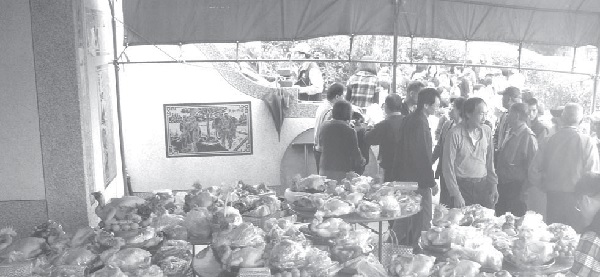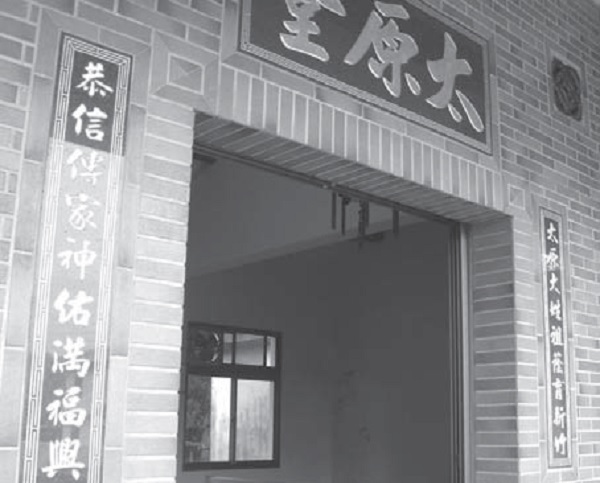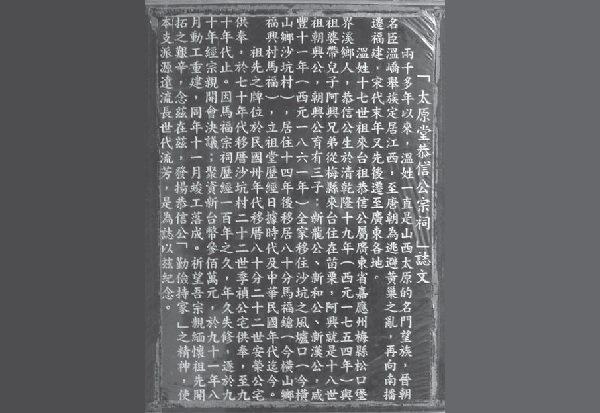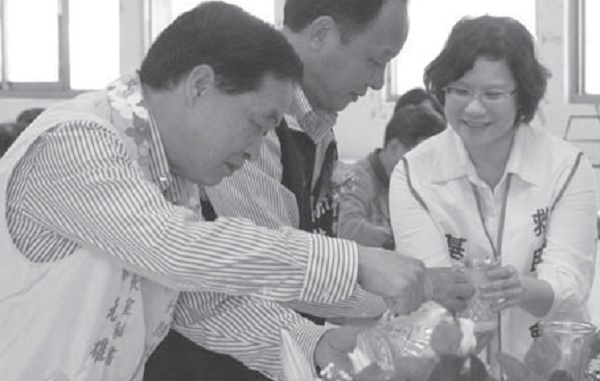When gospel and tradition collide
[From Ancestor Worship to Ancestor Respect] Ethnic Group Breakthroughs and Innovations of the Hakka Group
Photo provided/Wen Yingying, Wen Yingqian

Chinese ancestor worship has a far-reaching origin
Worshiping ancestors has always been a tradition in Chinese culture. It originated very early, possibly as far back as the Shang Dynasty, and became popular in the Zhou Dynasty. In particular, Confucianism attaches great importance to filial piety, which directly or indirectly promotes the rationality of ancestor worship. Chinese culture emphasizes that "filial piety comes first among all good deeds." Confucianism has the most exposition of the ethics of filial piety to parents. For example, in the "Weizheng Chapter" of The Analects of Confucius, someone asked Confucius what filial piety is? Confucius replied: "No violation" (no violation of etiquette), and further said: "In life, do things with etiquette; in death, bury with etiquette, and offer sacrifices with etiquette." (Serve according to etiquette during life, and bury according to etiquette after death. , and worship according to the rites.) "The Analects of Confucius" "Xue Er Pian", Confucius' student Zeng Zi said: "Be cautious in pursuing the future, and the people's morality will be strong." (Handle funerals carefully, remember the ancestors, and the people's customs will be simple.) Chinese This concept is presented in ancestor worship rituals to demonstrate the deep-rooted inheritance of filial piety.
Traditional folk ancestor worship includes offering sacrifices and offerings to ancestors, and the rituals have religious connotations. Generally speaking, the Chinese believe that ancestors still influence and bless their descendants. Descendants should drink water and remember their origins, be careful about their fate, and practice the filial piety preached by Confucianism. Therefore, they must worship their ancestors in order to receive the protection of their deceased ancestors. If they do not worship, they may be harmed by their ancestors. Spiritual punishment brings disaster. Therefore, Chinese people all over the country have ancestor worship ceremonies, which are usually held in front of the ancestral graves of the clan. It is generally called tomb sweeping. The Cantonese call it "worship the mountain" or "walk the green", and the Hakka people call it "hanging paper". Tomb-sweeping is usually done on or around the Qingming Festival. In some areas, people also sweep tombs at the spring equinox, Shangsi (the third day of the third lunar month) and the autumnal equinox. Both the Hokkien people and the Hakka people in Taiwan attach great importance to tomb-sweeping, and the seasons and customs of tomb-sweeping are also similar.
Taiwan's Hokkien people worship their ancestors, commonly known as "worshiping their parents-in-law." It is not limited to tomb sweeping, but also includes regular sacrifices at home, and annual ancestor worship ceremonies in various ancestral temples and ancestral halls. The Hakka people may pay more attention to ancestor worship than other ethnic groups, and they go to ancestral graves or ancestral temples to offer incense and worship during various festivals. After sweeping the tombs and worshiping, paper money is burned as banknotes for the ancestors in the underworld to spend, in order to pray for blessings and protection of the deceased, and to save the souls of the deceased. The process of purchasing funeral rituals for the Hakka people is quite complicated. During the funeral ceremony, a wooden sign, called the "God Master Sign", must be set up, with the name of the deceased on it for worship.
Burning incense must be included in the Chinese rituals of worshiping ancestors and worshiping the dead in temples (a custom that only appeared after the Tang Dynasty and may have originated from Buddhism and Taoism). Burning incense as a sacrifice has the religious connotation of worshiping the dead and treating the dead as gods, which violates the Bible's teaching that "there shall be no other gods before Jehovah" (see Exodus 20:1-3). When the folk rituals of burning incense, burning paper money, and kneeling to worship ancestors' tablets collided with the Christian faith, the rising tide greatly affected the spread of the Christian gospel, especially among the "hard-necked" Hakka people who never forget their ancestors. flat.
For Hakkas to preach the gospel, worshiping their ancestors is a hurdle
There are about 4.5 million Hakka people in Taiwan, accounting for about 20% of Taiwan's total population. According to a 2010 survey, the population of Christians (including Catholics) in Taiwan has reached 10.4%, with the Greater Taipei District having the highest number (12.4%). The higher the education level, the higher the rate of believing in the Lord; about 13% have a college degree or above; the military The number of public education personnel reaches 13.8%. The Hokkien people in Taiwan "worship their father-in-law and mother-in-law" while the Hakka people worship their ancestors. However, the conversion rate among the Hakka people is only 0.3%, which is far lower than the conversion rate among the aborigines and the Hokkien people. There are only about 40 Hakka churches in Taiwan.
The conversion rate among Hakka people is relatively low. There are two reasons for this:
1. Hakka is hard soil:It is generally believed that Hakka people are essentially hard-hearted and unwilling to accept the gospel. In fact, instead of saying that the Hakka people are hard-hearted, it is better to affirm the "hard-neckedness" of the Hakka people. In order to survive in remote and remote villages or mountainous areas, the Hakka people have developed a hard-working and unyielding personality, which is consistent with the Bible's accusation that the Israelites are hard-necked. Unwillingness to accept that the gospel is different.
2. Hakka is ignored:In the past hundred years, missionaries have mainly preached the gospel to the aborigines and Hokkien people, ignoring the Hakka people living there. This statement is also reasonable. At least when my brother was growing up, he never saw missionaries in the countryside (but there was a Catholic church in the town). Both Hokkien and Hakka people worship their ancestors, which creates a huge obstacle to the spread of the gospel, perhaps even more so for the Hakka people, but this cannot be an excuse for hard work.
In fact, the Hakka people are essentially the same as other Chinese people in that they reject the gospel and have hard ground on the gospel. The Hakka people especially have the ancient customs of the Central Plains and attach great importance to filial piety and ancestor worship. Therefore, in the process of spreading the gospel, many Hakka people cannot pass the test of ancestor worship first.

▲The Hakka people have the ancient customs of the Central Plains and attach great importance to filial piety and ancestor worship. In the process of spreading the gospel, many Hakka people cannot pass the test of ancestor worship first.
The Hakka Zhuang Wen family in Hsinchu preserves their family tree and never forgets their roots
Our brothers grew up in a Hakka village in Hsinchu, Taiwan. According to Taiwan's "Genealogy of the Surname Wen" (1995) and the genealogy of the Ugong Xingong branch compiled by the author's brother (2002), our ancestors came from Taiyuan, Shanxi. In order to avoid the disaster of war, they first moved to Jiangxi and Gannan in the late Tang Dynasty, and then moved east to Fujian. He went to Hangzhou and finally settled in Meixian, Guangdong. He was the first generation of Zhaoji in Meixian, Guangdong. The seventeenth generation ancestor Gong Xin came to Taiwan around 1800 AD to join the reclamation process. After that, his descendants multiplied and settled in the countryside of Hsinchu.
The Wen family gathers the ashes of their ancestors in an ancestral tomb, surrounded by ancestral tombs of other clans. They worship regularly every year, and the worship during the Qingming Festival is even more important. In order to avoid traffic jams during the Qingming Festival, the Wen family designated the last Sunday morning in March as the day to sweep the tomb. Hundreds of ethnic groups gathered to sweep the tomb, each bringing sacrifices.
The center of the courtyard, which is shared by several nearby Dafang tribesmen, was renovated a few years ago into an ancestral temple, in which the tablets of ancestors who came to Taiwan and their descendants are enshrined. The ancestral hall has the inscription "Taiyuan Hall" to commemorate the ancestor's origin from Taiyuan, Shanxi. Other clans also have their own ancestral tombs and ancestral temples. The ancestral temples are the best place to gather clan members, with their hall names indicating where their ancestors came from on the mainland.
Filial piety leads parents to return to the Lord; respect means serving ancestors and not descendants.
When Yingqian was studying in the United States, he and his wife were called to believe in the Lord. After becoming Christians, they enthusiastically preached the gospel to their families, especially their parents. However, he was rejected every time he preached the gospel to them. My father's main reason was that he was one of the heads of the Wen family and was responsible for worshiping ancestors. If he became a Christian and could not worship his ancestors, he would become a traitor to his ancestors.
A few months before my father passed away, he received the Lord and was baptized on his sick bed. My mother watched the ceremony. As soon as the baptism was over, my mother cried and said: "No one will worship him in the future, and no one will help him burn paper money. Your father is in hell." You will suffer..." Pastor Peng Delang, who baptized my father at that time, was also a Hakka. He clearly explained the truth about heaven and hell to my mother and emphasized that if you die after being baptized, you will "go home" as the Hakkas say. ”, will not fall into hell.
Pastor Peng's words had a great impact on my mother. Three years later, on her 80th birthday, my mother was baptized into the Lord in the church. A birthday banquet was held at noon, with several tables opened, and close relatives in the family were invited to celebrate together. The funerals held by my parents who passed away successively all used Christian rituals, which was the first of its kind among the elders of the clan. There were wonderful testimonies. Not only did no one object to the funerals, but the relatives and friends who gathered to pay their respects responded well. The baptism of our parents into the Lord greatly affected our family. Now almost all of us have believed in the Lord. Many relatives have also been influenced and have joined the Lord’s sheepfold.
Christians' "not worshiping their ancestors" does not mean "not respecting their ancestors". On the contrary, it means that they are doing their best to honor their ancestors. As far as our family is concerned, English lives in Hsinchu, where the ancestral tombs and ancestral temples are located. He is one of the leaders of the clan. He has contributed a lot to the construction and maintenance of the ancestral tombs and ancestral temples, as well as the relationship with the clan, and is quite respected by the clan members. . He also enthusiastically participated in tomb sweeping and ancestor worship ceremonies, but he did not burn incense or prepare sacrifices, but used flower baskets instead. When Yingqian was teaching at Donghua University in Hualien, Taiwan, he would rush back to Hsinchu as much as possible to participate in grave sweeping or ancestor worship ceremonies. He and Yingying and other Christian family members would use flower baskets instead of sacrifices to express their respect and remembrance. After a long time, he was also accepted by the tribe. .
There was an episode when our faction was rebuilding the ancestral temple. Ying Gan was teaching in Taiwan, and the elders of the clan asked Ying Gan to draft couplets on both sides of the ancestral temple. The horizontal couplet was "Taiyuan Hall". What Yinggan proposed was: "The ancestors of the Taiyuan surname nurtured Hsinchu, and they believed in the family gods to bless their fortunes." This family comes from Taiyuan, Shanxi, and the surname Wen was a prominent family in Taiyuan during the Tang Dynasty, producing many celebrities such as Wen Qiao and Wen Tingyun. etc., are called the common surname; the name of the ancestor who came to Taiwan is Gong Xin Gong. Our descendants settled in Hsinchu, and were cultivated by our ancestors like a lush Hsinchu; the ancestral temple is located in Fuxing Village, where Yingqian prays, and the true God Blessings fill Fuxing Village. The elders in the clan thought the couplet prepared by Ying Gan was very good. No one bothered to examine the word "god" in detail, but it was put in deliberately. It was hoped that the true god would make the clan believe in the Lord, which would be the real protection. And the ancestral temple The journal articles are written in English.

▲When the Wen family worshiped their ancestors, Wen Yingying used flower baskets instead of sacrifices, which was also accepted by the clan members.

▲On the Taiyuan Hall, the ancestral hall of the Wen clan, the word "god" was deliberately included in the couplet written and customized by Wen Yingqian, praying that the tribesmen would know the true god and receive true protection.

▲The ancestral hall of the Wen clan hangs a memorial written and customized by Wen Yingying.
Innovative Funeral and Ancestor Respecting Ceremonies
In the mid-1980s, Christian leaders in Taiwan began to discuss the issue of Christians and ancestor worship. After much discussion, Christians' participation in ancestor worship was defined as an ancestor worship ceremony, and the ceremony of three memorial rites was adopted. The Hakka Evangelical Association based in Hsinchu has started to compile a "Christian Funeral and Ancestor Respecting Handbook" for Christians to use. It also provides a clear explanation to non-Christians and makes it easier to spread the gospel.
The book clearly explains why there is a need for a biblical and sensible manual on ancestor worship and funeral services. "It is a very good tradition and concept of the Chinese to be cautious about death and pursue the future. Life and death are important events in life, and God considers the death of saints to be extremely precious. However, some unreasonable practices have been added to Taiwan's funeral ceremonies, such as extravagance, asking people to cry on behalf of others, and the inconveniences brought about by folk religions. The superstitious color makes the funeral ceremony lose the respect and sincerity it should have. "This book provides the following funeral etiquette that is in line with the truth and humaneness:
1. Three rites of remembrance
This is the etiquette of worshiping God, including the ceremony of pouring water, laying flowers and lighting candles, which respectively represent the meaning of drinking water to remember the source, the virtues of ancestors and the glory of ancestors. Christians can express their worship to God and their gratitude to their ancestors by performing three memorial services during the Qingming Festival, ancestor worship meetings, ancestor worship memorial services, or family ancestor worship and tomb sweeping occasions.
As for whether to invite non-Christians, especially politicians, to officiate, it was agreed upon after much discussion. The reason is: allowing non-believers to participate in the officiating ceremony is also worshiping God. It allows them to understand the reasons why Christians respect their ancestors rather than worship them, making it easier to spread the gospel. The entire ceremony is presided over by a Christian, and the officiant only holds the objects high to show that he is lifting up God, rather than worshiping ancestors. This has the effect of changing the customs of the entire ancestor-respecting ceremony. Therefore, over the years, Christians have invited some social sages and political figures to participate in the ancestor worship ceremonies. Some of them are believers in the Lord, but most of them are non-Christians.

▲The "Three Remembrance Ceremonies" include the water-pouring ceremony, the flower-laying ceremony and the candle-lighting ceremony, which respectively represent the meaning of drinking water to remember the source, the virtues of ancestors and the honor of ancestors.
2. Salute
Christians can pay tribute to the deceased or ancestors in a suitable and guilt-free way by laying flowers and bowing. During the funeral, three memorial rites are held first, and then this ceremony is held to replace the traditional public sacrifice ceremony, or the ceremony in front of the ancestor's tablet or tombstone.
3. Display family tree
The genealogy of each clan will also be displayed during the ancestor worship meeting. Hakka Christians are also encouraged to make "ancestor memorial tables" or "generation inheritance tables" and hang them in a conspicuous place in the living room of their homes to show that Christians do not want their ancestors, but The way is different.

▲The Ancestor Respecting Conference is hosted by Christians and invites social sages and dignitaries to participate in the ceremony, which has the effect of changing customs.
Respect our ancestors and worship the Triune God first
English has participated in several Hakka church ancestor worship conferences. In March 2014, I had the honor to personally serve as the director and preside over the ancestor worship meeting in Xinfeng and Hukou areas of Hsinchu County. I presented the "Three Remembrance Ceremonies" ceremony to the church members and fellow villagers present with a pious heart.
This time, we teamed up with the churches in the area to participate in this grand event and it was held at the Xinfengxiang Community Activity Center. In order to bear witness to the general public who have not yet believed in the Lord, several social sages and local politicians are invited as usual to let the public understand the position and practice of ancestor respect by Hakka Christians, and to reduce the suspicion of Christians who "forget their ancestors - do not want their ancestors and are not filial" Parents, contrary to Chinese cultural traditions" misunderstanding. Although most of the invitees were not Christians, our participation in the Ancestor Respecting Conference gave us the opportunity to bear witness. If the ideas of local leaders change, it will have a positive impact on the entire society.

▲The venue for the 2014 Ancestor Respecting Conference in Xinfeng and Hukou areas of Hsinchu County.
The process of commemorating the three rites is as follows:
1. Pour of Water (Connection with the Holy Father)
When the Secretary announced the "water pouring ceremony", the two officiants raised the water bottles prepared in advance and poured the water into another empty bottle, which means "drink water and remember the source".
At this time, the Secretary will lead the congregation to use the "Inspirational Text" to emphasize that our ancestors and all things were created by God, and all our blessings are also given by God! Remembering our parents and ancestors means that our blood has their inheritance, just like all rivers have their origins! When we drink water and think about its source, we should also think of the source of our lives—the Triune true God. We always submit before Him and give all glory to God!
2. Flower presentation (connecting with the Son, Jesus Christ)
The two officiants held up the flowers to commemorate the ancestors, which means "the virtues of ancestors will last forever"; the secretary and the congregation took turns to read the corresponding scriptures, reflecting each other's beauty.
The fragrance exuded by flowers is just like the beautiful examples left by our ancestors! The most important thing is to thank the Lord Jesus Christ, who bore all the sins of the world and our ancestors, was crucified on the cross, and rose again from the dead. The resurrected Jesus Christ has allowed our ancestors and relatives to leave such beautiful footprints. May their virtues be immortalized throughout the ages, and may their descendants be edified by their virtues.
3. Candle lighting ceremony (connecting with the Holy Spirit)
After the two officiants lit one candle, they used it to light another candle, which means "glorifying the ancestors". The ceremony was carried out with solemnity and sacred music, and the congregation was immersed in the atmosphere of respecting their ancestors!
We commemorate and thank our ancestors who burned their lives in their generations and worked hard for the future of future generations. I pray that the Holy Spirit will fill and enlighten future generations, so that future generations will live like bright lights in the world, emit light and heat in the era, and display virtues to glorify God and benefit people!
At the end of the three memorial services, the non-believers in the congregation all appreciated the Christians' filial piety and sincerity in worshiping their ancestors. Many people said that they had never imagined that a Christian ancestor-reverence meeting could be so simple, solemn and polite, and they would help promote and share it when they return. We even hope that our fellow villagers and friends who have not believed in the Lord will one day convert to Christ and get rid of the bondage of idolatry!
Conclusion: Actively participate in ancestor worship and promote the spread of the gospel
Since Christianity was introduced to China, the issue of ancestor worship has been one of the biggest reasons preventing Chinese people from believing in Christianity, especially the Hakka community. Today, Christians can clearly explain their stance on ancestor worship and filial piety to non-believers on various occasions. In your own family's ancestor worship ceremony, you don't have to avoid participating because of taboos. Instead, you can actively participate, but do not burn incense, and use flowers instead of sacrifices. You can also use various occasions to explain the meaning of ancestor worship to the clan members and publicize the three memorials. The meaning and practice of rituals, salutes and display of genealogy. In addition, when local churches hold joint ancestor worship ceremonies, they can invite relatives and friends who are not believers in the Lord to participate. I believe that the issue of ancestor worship that has long plagued Chinese Christians and non-Christians has been brought to an end, making it easier to spread the gospel.
 Author profile
Author profile
Wen Ing-wen is the person in charge of the "Li Steel Machinery Hardware Store" in Hsinchu, Taiwan, a director of the Wen Clan Association in Hsinchu County, a promotion committee member of the International Gideon Society in Northwest Taiwan, and a volunteer consultant for the establishment of the Taiwan Hakka Mission Theological Seminary.
 Author profile
Author profile
Wen Yingqian, Kingdom Resources is the chairman of the board of directors of the Christian Association in the United States and Taiwan and the editor of the talent section of this magazine. Honorary professor of the Department of Economics and Department of Finance of Donghua University in Taiwan, director of the American Chinese Outreach Ministry of Crown Financial Ministries, and director of the Christian Messengers Association.
